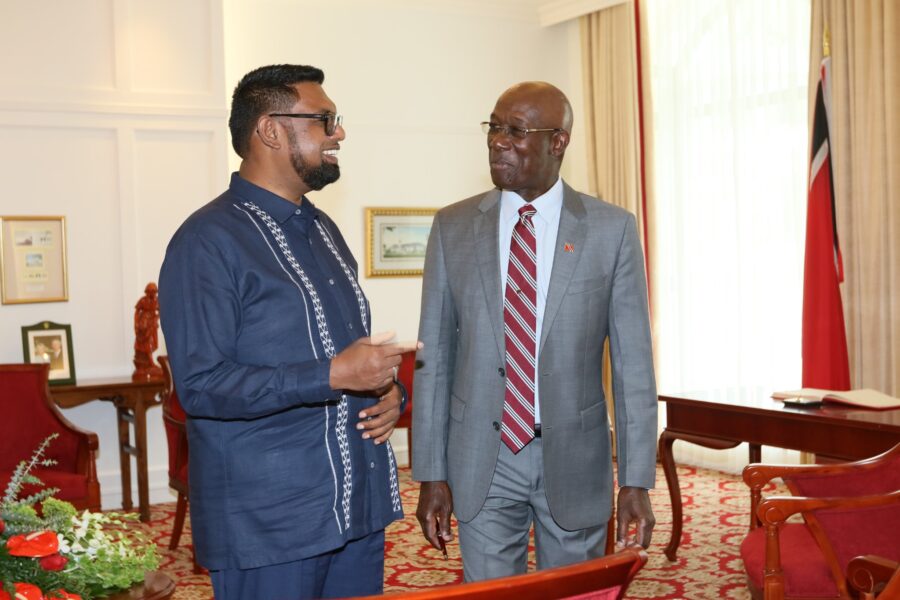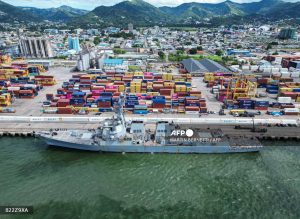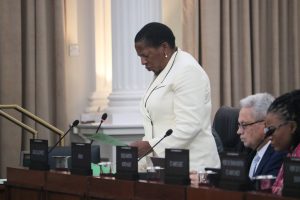By Sue-Ann Wayow
A TECHNICAL task force is already working to examine and report on issues affecting agriculture in Trinidad and Tobago and Guyana, especially non-tariff issues.
On Thursday, President of Guyana Dr Irfaan Ali and Prime Minister Dr Keith Rowley spoke at a joint press conference held at the Diplomatic Centre in Port-of-Spain.
Dr Ali is on an official State visit to Trinidad and Tobago and discussions will focus on four main sectors – energy, agriculture, tourism and youth development with food security topping the list.
Dr Rowley and Dr Ali both said that it was an issue that needed to be dealt with a sense of urgency.
T&T’s Prime Minister emphasised that the culture of consumption of imported food needed to be changed because as long as there were external circumstances, the supply of food would be affected. This was made clear with the Covid-19 pandemic and the Russia-Ukraine war.
There is focus on removing non-tariff barriers so that the trade of food and food supplies will be made much easier.
Dr Rowley said that the operationalisation of the Caribbean Single Market and Economy (CSME) would ease the strain of trade issues, especially at individual ports.
He said, “Goods arrive at individual ports, whether the port is Kingston, Georgetown or Port-of-Spain. And it is at that port that somebody makes the decision as to whether the goods will enter or not…that is where the non-tariff barriers come in to work. The non-tariff barrier in St. Vincent is different to the one in Grenada for the same product or the one in Trinidad for different reasons and that is what we are trying to get out of the way.”
He continued, “If we say, we have a single market and economy, that should mean something.”
It means that goods, people and finances should be going to any part of the market unimpeded Dr Rowley said and there were some “sticky, stagnant trade issues” that might arise that require some intervention.
The non-tariff issues have been listed out and the task force set up to focus on creating and implementing policies to have those tariffs removed.
Holding up a document entitled The Food Development Plan focusing on the two countries, Dr Rowley listed the areas of interest.
These include aquaculture, rice, human resources, agro-processing, livestock productions, shade houses, coconut projects, technical task force, corn and soya.
“These are the areas where we are taking action on in a collaborative way,” Dr Rowley said.
Dr Ali pledged his commitment to working together.
He said, “We are very clear on transparency in this relationship.”
Dr Ali said, “Trinidad and Tobago and Guyana, we have accepted that there are areas that must be improved. We have now developed a mechanism through which we are going to advance working towards those areas. The task force will be looking at the Trinidad and Tobago and Guyana issues.”
Such issues are those that affect the efficient movement of goods into Guyana and Trinidad and Tobago and how they should be resolved in a sustainable way.
If demonstrated to the rest of the region that it was a successful pathway, other countries would want to follow suit, Dr Ali said.
He also said that there were large distributors who feel threatened by the move but should not as they too would stand to benefit.
Trinidad and Tobago will also be getting 5000 coconut plants from Guyana as well as shade houses to boost agriculture, Dr Rowley said.
With the 2022/2023 Budget due soon, Dr Rowley said he anticipates that there will be allocations towards the sector as more intense investments are being made.
However, he called on the private sector to step up as he said government will create the policies and supportive network but the investment needed to be from private citizens.
Dr Rowley also said a task force focusing on energy is also expected to give a report by September.
Dr Ali is expected to attend the Agri-Investment Forum and Expo scheduled for this weekend in Port-of-Spain.
![]()













